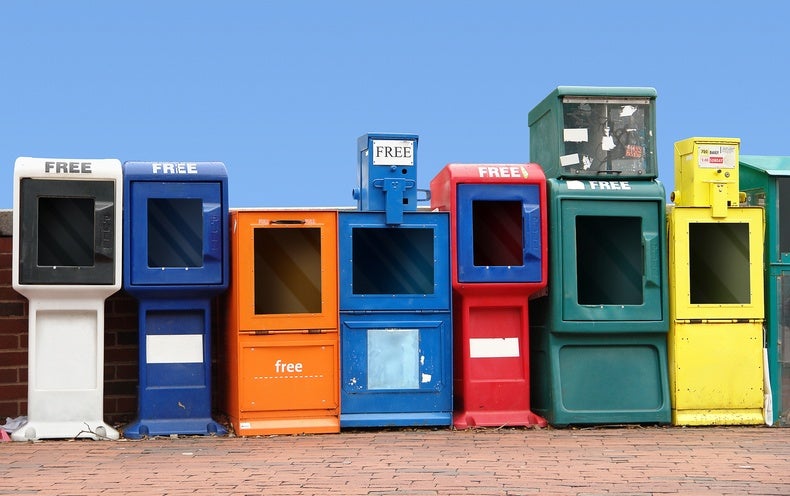Scientific American
Like PBS or NPR or are they saying more should be. I think a better route is consequences for lying and calling yourself an entertainment company in court but having news in your name.
Only about 15% of PBS and 1% of NPR come from federal funding. The vast majority of both come directly from community, non-profit, and corporate support. The Voice of America is the only state funded media.
There is a separate discussion about whether or not that is actually good for a society, or just adds a path for state-influenced propaganda.
It looks like NPR is more like 8% but they’re both still way lower than I thought. https://gigafact.org/fact-briefs/does-npr-receive-less-1-its-funding-directly-federal-government
I think in a perfect world you’d have access to both and both public and private funded news would be around the same in popularity.
I think the issue in the US right now is that it’s pretty much only private and no public funded news.
One of the major problems with PBS and NPR is they aren’t publicly funded enough so they have to get a lot of funding from billionaires’ foundations.
Oh no, please, let the billionaires keep their money! They worked so hard for it.
When their foundations fund NPR, that’s the editorial line that gets taken, yes.
¿por qué no los dos?
It sounds like a great idea until you think about if Trump had gotten a hold of it while he was in office. If we were guaranteed no trump like figures in our future, then I would say both.
They’d be some of the better tools to keep someone like trump from getting in power. Nothing is safe anywhere when someone like trump is in power.
Both fair points.
Good good. We’re relearning things we figured out pretty definitively back in the 60s

This isn’t what I thought living in the future was going to be like.
Elaborate, friend
If only we actually applied the “public good” principal, then government would also cover healthcare, dental care, eye care, cognitive-behavioral care, education, internet, phone, electricity, and gyms at least.
OIL and coal. Anything and everything oil related should absolutely not be allowed to be private or for-profit under any circumstances. I will take this to the grave for two simplified reasons:
- Oil, fuel and all related is too ingrained into our society that you can’t escape it. Should not be profit driven.
- It’s catastrophic effect on our habitat. Pollution, global warming, etc.
Thank god there are literally no possible consequences to the government running the entire economy.
Amen
Amen
Removed by mod
Or public relations and marketing.
But then they would have to report on the systems funding them. That’s a bit too easy for corruption to take place in my opinion.
That’s why you have multiple outlets within a public system, governed by a public institution chosen by those outlets instead of any government. Subsidize those outlets by subscribers regardless of political affiliation.
There are examples of this system or systems like it working, more or less, in various liberal democracies across the globe. And with across the globe I mean mainly within Europe.
Japan has a fee on any device capable of receiving a television signal (cost varies based on capabilities) used to fund the NHK and one reason was to keep the government influence out. Today, it still often has huge bias and avoids certain reporting and tows government lines. Sometimes translations over English or other languages completely changes what the people are really saying. NHK does produce some good programming, but they also are definitely up the ruling party’s ass.
It can be, and it’s a valid point. But some countries do publicly fund their government broadcaster and have safeguards in place to maintain journalistic integrity. It can be done properly.
Australia is one: https://about.abc.net.au/who-we-are/the-abc-board/. The ABC regularly has fact checking articles for politicians on all sides and has exposed many a government scandal over the years.
My country has a public broadcaster called NRK, which is funded by taxes paid by the people. By law they are funded by the public, but they have full editorial freedom (NRK-plaque) and they got a special board made up by members of the public to handle complaints and ethical issues. They are governed by Medietilsynet (eng.: The Norwegian Media Authority), and have a special responsibility to support democracy and public knowledge.
NRK digs up dirt on and criticises members of Parliament (Storting), Parliament itself and the different ministries.
In Canada I fully want to keep CBC (Canadian broadcasting corporation). Guess which party wants to get rid of it.
Preach
im assuming whatever conservative parties are there
I’d at least like to see more non-profits and coops in the news business. Of course I’d like to see more of that in pretty much every business.
I notice a fair number of people suggesting that it might give incentive to corrupt the public media outlet, or that it may be biased toward the government funding it… and yeah… that’s probably true to one degree or another. But, that said, I think we all should take a moment and think honestly about bias in media. All media is biased, especially the ones that claim they’re unbiased. Just because it’s privately funded doesn’t make it any less succeptible to corruption or bias. Indeed one of the biggest complains about our news is that the majority of media companies are owned and operated by, what is it, six(?) companies, and we know they all mislead people regularly on issues that affect them. Instead of focusing on removing bias from media, we should all be more diligent about being skeptical of the author’s presentation of the media we consume regardless of funding source, and particularly when it is selling is info that we agree with and that angers us.
Yes, it’s important to believe nothing and criticize everything. But in this day in age, I’d rather trust the publicly funded stuff than the privately funded media, due to the amount of scrutiny
But then fuckwads like Musk will declare it “state run media” and sow distrust. Not that they trust any media not serving up confirmation bias…but anyway. It’s a laudable ideal that right wing monkeys will fuck up.
For some reason state run media = bad, but media run by oligarchs who have proven themselves to be complete dickheads on multiple occasions = totally fine.
Not only that, it also puts control of the state media (or anyway, strong influence) in the hands of fuckwits like Trump.
In india we have publicly funded news but most people say they are propaganda machinery for govt !
Rightly so. Publicly funded media is basically a propaganda outlet.
let them jump up and down like the chimps they are
i like the BBC. (publicly funded)
That’s what she said.
Ehhh… I’m not so sure. If it’s publicly funded, what incentive is there to investigate government corruption?
Would Watergate still have happened if Nixon had the ability to cut the WaPo purse strings?
if that funding were guaranteed and beyond the influence of those government officials, then they wouldn’t have any fear of revenge-based budget cuts.
this could be accomplished by putting control of the funding into the hands of multiple levels of committee oversight so that no one person or even a single committee could threaten it.
That’s the problem, when it comes to government funding, nothing is guaranteed. :)
Witness:
That’s why I suggested multiple levels of oversight. Also, they kept their funding.
They did, because Mr. Rogers defended it. If he hadn’t been there to step up it likely would have been cut.
That’s the problem. You get one party in power who doesn’t like it for some reason, it’s gone.
What you’ve shown is the system -democracy - working as intended. I’m not sure how that’s a criticism.
That’s the problem. You get one party in power who doesn’t like it for some reason, it’s gone.
except your “evidence” proves the exact opposite.
Kinda like how Reagan removed the fairness doctrine… Oh, sure, any ol’ President could have it restored… 8 years of Clinton, 8 years of Obama, 2+ years of Biden… Hey, it’s only been since 1987… 36 years… I’m sure it will be back any day now…
what does that have to do with government funding of journalism?

this is why we protect the speech and the journalism… it’s like the whole vaccine argument all over again…
It depends entirely on how the funding arrangement is enshrined. Some mechanisms are easier to undo and some are practically impossible to undo.
So while you could say that nothing in our world is guaranteed, it’s going too far to say we shouldn’t have publicly funded media because any old president can just snap his fingers and make it all go away. That’s not the case.
And even if funding were easy to pull, that would mean no public media until someone else snaps their fingers and restores it.
Kinda like how Reagan removed the fairness doctrine… Oh, sure, any ol’ President could have it restored… 8 years of Clinton, 8 years of Obama, 2+ years of Biden… Hey, it’s only been since 1987… 36 years… I’m sure it will be back any day now…
Here is an alternative Piped link(s): https://piped.video/fKy7ljRr0AA
Piped is a privacy-respecting open-source alternative frontend to YouTube.
I’m open-source, check me out at GitHub.
Thanks for sharing this.
this is why universities have endowments. and why they become convulted messes.
of course, they don’t use them like they should, but that’s another issue entirely.
sadly people are greedy and short sighted, no matter the institution. often the committees want to reward themselves above all else.
That’s the problem with charity— free reporting becomes a privilege bestowed to a select a few by private institutions and subject to their whims rather than a right guaranteed to everyone by the government. 
deleted by creator
not all of us are ready to just give up so easily. I’m willing to fight for the nice things we have, even if you’re not.
deleted by creator
I’m referring to meaningful fighting for our collective rights, not fighting amongst ourselves— such as with petty contrarianism.
deleted by creator
no thanks
Publicly funded doesn’t mean government controlled, PBS and NPR only get about 10% of their budgets from the government. Most of it comes from Viewers like You! (Donations)
NPR’s two largest revenue sources are corporate sponsorships and fees paid by NPR Member organizations
https://www.npr.org/about-npr/178660742/public-radio-finances
39% corporate and 31% fees, compared to 12% from contributions. I think federal funding grants fall under the 8% “other” in that breakdown.
Public service journalism is really good in the US and yes, it deserves public funding. It needs to be funded publicly. As a matter of fact, NPR and PBS are, in my opinion, the best news sources in the world. I’ve lived with public journalism in other countries. It’s publicly funded, but its reporting often gets filtered by whatever party is in power. It’s a shame more people don’t realize what a national treasure the US has and does not appreciate it because, you know, taxes.
But public funding isn’t the problem. The problem is that private funding is also allowed. And so the people with the most money control what is told to the other 99%.
And no, disallowing private funds for journalism that is also getting public funds isn’t a solution either, because then they still have their 100% private “journalism”. And banning those in general would be met with a lot of crying about press freedom.
internet ‘journalism’ needs to be included in that, and it should cover platforms like lemmy
The way govts around the world are trying to curb good journalist , I feel the news shall be on a tor network , so that the govt cant mess with it ! But at the same time misinformation is also on the rise !















